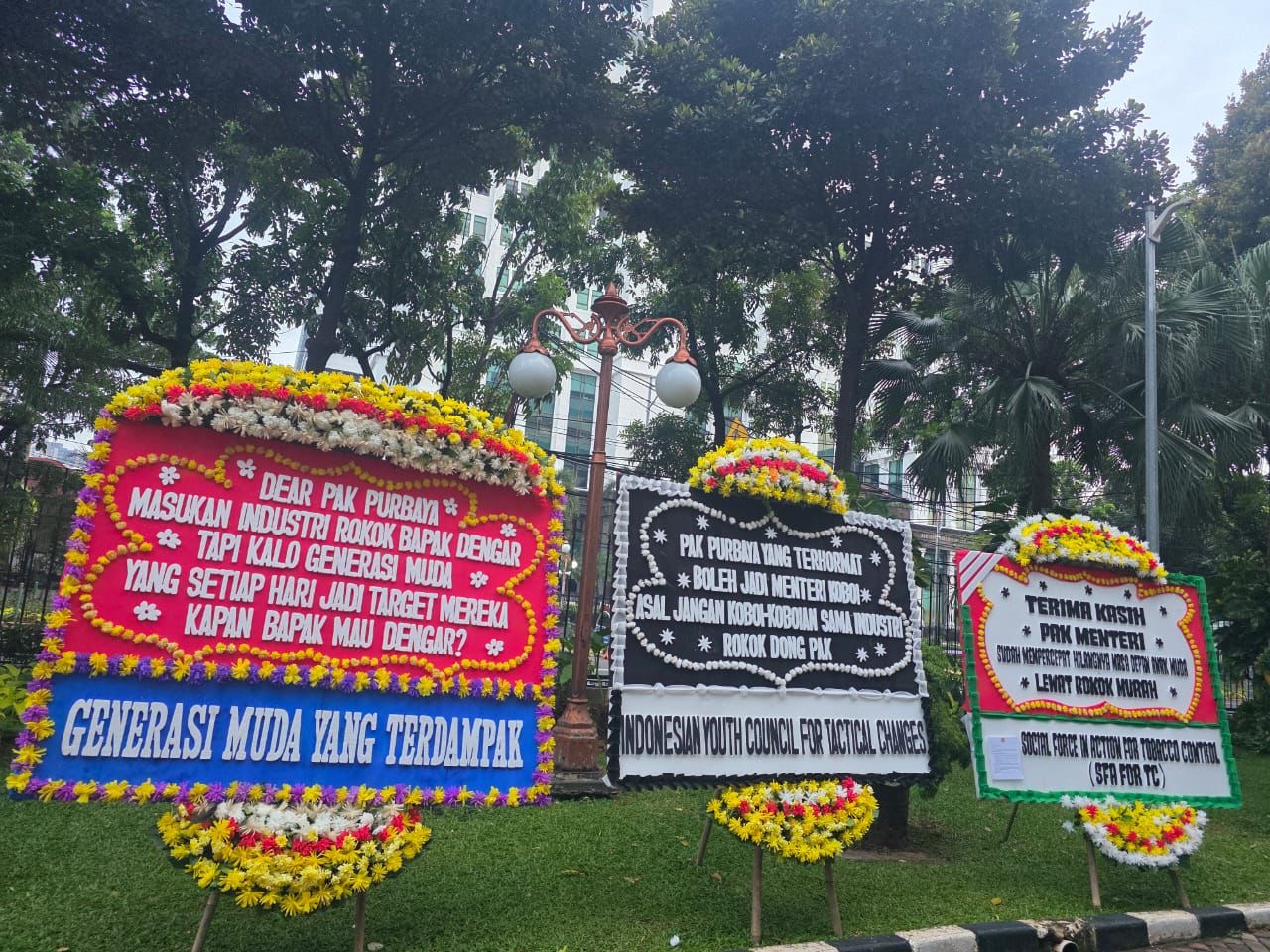The Ministry of Finance’s office in Jakarta was filled with flower boards on Tuesday (Sept. 30, 2025), a symbolic wave of both support and criticism following Finance Minister Purbaya Yudhi Sadewa’s decision not to raise tobacco excise taxes in 2026.
The displays came from diverse groups, ranging from anti-smoking advocates to tobacco farmers. Some boards delivered sharp criticism, while others expressed support for maintaining the tax.
One board from the Indonesian Youth Council for Tactical Changes (IYCTC) read: “Honorable Minister, be a cowboy if you want, but don’t play cowboy with the tobacco industry.”
Meanwhile, a banner from the Tobacco Farmers Association of NTB praised the policy: “Excise stays, right decision, illegal cigarettes we will fight!”
Minister Purbaya confirmed the freeze after discussions with leading tobacco companies such as Djarum, Gudang Garam, and Wismilak.
“So, in 2026, excise tariffs will not increase,” as reported by CNBC Indonesia.
Instead, Purbaya emphasized his focus on tackling the illegal cigarette market, which includes both smuggled and domestically produced untaxed products. He outlined a strategy to establish a centralized system for the tobacco industry (IHT), incorporating customs offices, warehouses, and factories in special designated zones.
“This one-stop service system has already been implemented in Kudus and Parepare. We will expand it further so that illegal cigarettes can be absorbed into the formal system and pay taxes properly,” he explained.
According to Purbaya, this approach is designed to integrate small-scale producers, ensuring they contribute to state revenue without being driven out of business.
Critics Warn of Public Health Risks
However, health advocates and civil society groups argue that the decision could worsen Indonesia’s tobacco crisis. Critics highlight that the country already has nearly six million child smokers and one of the fastest-growing rates of e-cigarette use among teenagers.
IYCTC Chairman Manik Marganamahendra argued that keeping cigarette prices low only makes it easier for youth to fall into addiction.
“Higher excise is one of the most effective tools to prevent future generations from tobacco-related diseases.” He stressed, as quoted by Detik.
Manik also cited World Health Organization (WHO) guidelines, which recommend setting cigarette prices at least 70% higher through excise to effectively discourage consumption. He warned that delaying the hike signals that public health is not yet a government priority.
Economic and Fiscal Implications
Critics also questioned Purbaya’s reasoning that raising excise could drive up illegal cigarette trade. Daniel Beltsazar Jacob, Advocacy Lead of IYCTC, stressed that global evidence shows illicit trade is more influenced by weak enforcement and smuggling networks than by excise levels.
“The solution is to strengthen Customs with better track-and-trace systems and allocate revenue-sharing funds for enforcement at the local level,” said Daniel.
Civil society groups further emphasized the economic toll of smoking. In 2019 alone, BPJS Kesehatan spent Rp 15.6 trillion covering smoking-related illnesses. For low-income families, cigarettes consume up to 12% of household income, often at the expense of food and education.
While Purbaya maintains that his policy protects small producers and prevents job losses, public health advocates argue that the long-term costs of smoking far outweigh the short-term benefits. The debate reflects Indonesia’s ongoing struggle to balance economic interests in the tobacco industry with the urgent need to protect public health.
Source: CNBC Indonesia, Detik
Photo Credit: Doc. IYCTC


